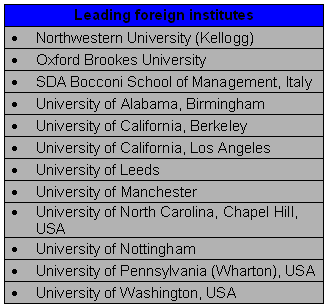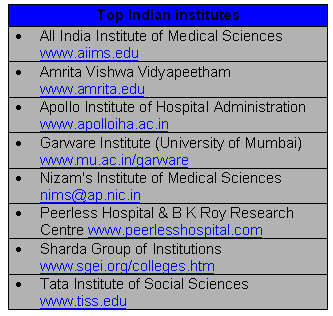
It is a trade-off, but a worthwhile one. As a doctor, I could take care of only my patients. As a trained administrator, every person who enters the hospital is mine," says Dr Ramachandra, administrator of Care Hospitals, a hospitals chain in south India. A medical doctor, he also holds a PhD in Hospital Administration from Ohio State University.
Medicine has travelled a long way. Technology now dominates medical procedure, and diagnosis is automated to a large extent says Dr Ramesh Viswanath, faculty at Indore University. With nearly 2.5 million medical establishments in the country, opportunities could only go up.
Awards and eligibility
As a specialised postgraduate professional course, hospital administration demands that either you are qualified in medicine and in that case you are eligible to compete for an MD (Hospital Administration), though the seats are a few, say four, in Nizam's Institute of Medical Sciences, and only a few institutions offer the course.
In general the Master's in Hospital Administration (MHA) is the most preferred one and any graduate with preferably one or two years of experience can enter the profession. A certain level of innate empathy for patients, and an ability to decide under extremely stressful conditions are a must, opines Col Gautam, faculty, Academy of Hospital Administration.
The latest entrant in the sector is an MBA degree with Hospital Management or Healthcare as a specialisation.
The great debate
To Dr Devaprasad, consultant surgeon, Jayasekaran Medical Trust, only a trained medical doctor could be a hospital's administrator. While Dr Thulsiraj, a leading ophthalmologist, at Arvind Eye Care counters, "For a nation of the size of India, medical care must be standardised, broken into manageable steps performed by an efficient chain, so as to serve volumes with least cost."

 The best of the lot is on offer from AIIMS. But entry is difficult and if one is not a medical graduate, then one could only apply for a sponsored seat, and that after a minimum of seven years' experience in responsible positions.
The best of the lot is on offer from AIIMS. But entry is difficult and if one is not a medical graduate, then one could only apply for a sponsored seat, and that after a minimum of seven years' experience in responsible positions.
Explains Dr SK Gupta, HOD, "Unlike a medical graduate, ordinary graduates would not spend long years in hospital. So it is imperative that they come with sufficient experience in a hospital, before they could be trained on the state-of-the-art in the discipline."
TISS with its long-standing engagement with developmental issues has also launched the programme recently. Nizam's college, Hyderabad and Apollo Institute, are also very well known institutions. Internationally hospital administration is a well developed field, and more than 450 institutions offer teaching and research programmes. USA has the most diverse offerings, and Europe is not far behind.
What do they teach?
A normal Master of Hospital Administration (MHA) is of two years' duration, with a semester's worth of internship in the case of some colleges. The first year course focuses on providing an in depth knowledge about the fundamentals of business administration with special emphasis on business environment, organisation theory, quantitative methods, and computers in administration, but with an orientation towards healthcare.
Some colleges like TISS, Loyola Academy and even Nizam's offer inputs on public health issues and social aspects of health in the first year. The third and fourth semesters introduce students to subjects of hospital management, patient care, records maintenance, information systems etc.
Since most of the hospital administration courses are on offer from institutes with medical colleges, substantial time during the second year is used to provide hands-on experience in the hospital. Man management and people issues are other aspects that are given substantial attention in an MHA programme.

 The courses deal with aspects of healthcare, but their target audience is very different. MHA is primarily hospital management and is a relatively focused programme, wherein the primary objective is to train a set of people who would be able to run a hospital efficiently.
The courses deal with aspects of healthcare, but their target audience is very different. MHA is primarily hospital management and is a relatively focused programme, wherein the primary objective is to train a set of people who would be able to run a hospital efficiently.
On the other hand an MBA (healthcare) is a management degree with a focus on healthcare sector. Thus, a graduate, would find jobs not only in a hospital, but also in a range of allied sectors.
What an MBA (Healthcare) loses in focus, it gains in diversity. As Prof Parameswarn, Dean, Corporate Services, Amrita University says, "MHA is for people and who know and want to serve in a hospital, it is hands-on programme."
Where would you fit in?
While medical graduates generally take care of the more technical aspects of hospital administration, non-medical graduates handle the operations aspects. The tasks would typically involve managing the staff, health services, technology decisions, IT management and performing under a given budget.
The career path for a fresh MHA in a hospital would be managing one department or functionality as asstistant administrator. And as they gain experience, the domain of control changes, but final authority on clinical matters will always rest with the medical professional.
Salaries would range from about Rs 3.5 lakh per annum in a medium hospital to upwards of one crore as an administrator in a super specialty 1,000-bed hospital, as one moves up the value chain. The other avenues are in consultancy, IT firms, educational institutions and health insurance sector.
Dr Ramachandra concludes, "Money does matter, but the sheer thrill, in seeing a complicated patient get completely well and move out of the hospital is priceless."